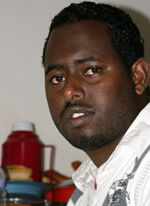Violence has cut through the life of 28-year-old journalist Abdulahi Ibrahim Dasar, from his high school days in Kismayo, the third-largest city in Somalia, to his life as a refugee in South Africa. The turbulence of Dasar’s life also explains his entry into journalism, a profession that has made him a target of assassination by hard-line Somali militants.
Back in 2001 in Kismayo, Dasar had ambitious plans to become an entrepreneur, but bloodshed from local clan warfare forced his family to seek refuge in South Africa. In the peaceful suburbs of Cape Town, the familiar sound of bullets was gone at last. Very little knowledge of English and difficulty clicking the South African isiXhosa language spoken by the people of the Western Cape did not stop him from venturing into small-scale kiosk work selling groceries.
Business was picking up until the streets suddenly erupted in deadly xenophobic violence in May 2008. As one of many Somali shopkeepers targeted in the violence, Dasar told me he has not recovered the 130,000 rand (US$18,600) he estimates to have lost in business.
Pondering his next move, and having no avenue to express his frustration and that of his community, which was increasingly intolerant toward foreigners in a country otherwise regarded as one of the freer democracies in Africa, Dasar teamed up in late 2008 with one of his friend to launch a bimonthly magazine called Qurba-joog (Somali for “diaspora”).
Even though Dasar had no journalism training or experience in the profession, the six- page publication did well among the Somali nationals in Cape Town, where it mainly circulated. As a credit to his success, Dasar was asked to become a reporter for Universal TV, a U.K.-based Somali-language satellite network with correspondents and offices in Cape Town. Reporting on local Somali community affairs, he was growing as a journalist.
However, as if caught in déjà vu, Dasar’s life was turned upside down again in May, two years after his business was destroyed. During a report on the public controversy surrounding South Africa’s Mail & Guardian‘s publication of a cartoon of the Prophet Muhammad, Dasar displayed on the air a copy of the newspaper page with the cartoon. The caricature by South African editorial caricaturist Zapiro was a commentary on another controversy sparked by American illustrator Molly Norris’ cartoon calling for May 20 to be “Draw Muhammad Day” (in protest of Comedy Central’s censorship of a depiction of the prophet in an episode of its satirical animated program South Park.) The Seattle Weekly reported on September 15 that the FBI advised Norris to disappear following death threats by an extremist cleric with ties to Al-Qaeda.
For showing the Mail & Guardian‘s cartoon while reporting on the controversy, Dasar also became a target of Somalia’s Al-Shabaab insurgents, particularly the Al-Qaeda-linked Al-Shabaab, which have in the past claimed responsibility for killings of journalists in Somalia. The group first banned Universal TV in its strongholds in Somalia and issued a fatwa calling for Dasar’s assassination. The insurgents claimed on their website that Dasar was paid by Christian churches to humiliate Muslims and the prophet.
Dasar rejects the accusations. “I have been shocked and wonder why these people think and believe that I can abuse or support people who abuse Prophet Muhammad. I am also a Muslim and therefore, he is also my prophet. I’m a born Muslim and I will die a Muslim, God willing,” he told CPJ. Al-Shabaab would not accept Dasar’s apology, which he issued on government station Radio Mogadishu.
Within two days of the broadcast, Dasar received phone threats in South Africa. “They said they can easily make an explosion in any of my hideouts in South Africa,” he said.
The July 11 terrorist attacks in Uganda added to Dasar’s anxieties. “I’m really scared because I don’t know who is Al-Shabaab or who is against me or who is on my side,” he said.
Since the threats, Universal TV, under pressure, suspended Dasar. He is a father of four and the sole breadwinner for his family. Currently without a job or income and uncertain of what his future holds, Dasar told me he remains a committed Muslim and a member of the independent press and nothing will force him from either. His immediate concern, however, is protecting his life.
(Reporting from
